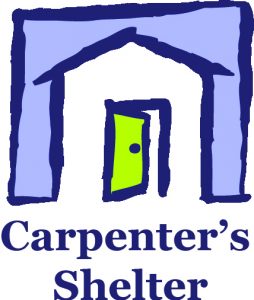 Carpenter’s Shelter
Carpenter’s Shelter
What does being a finalist for this award mean for you and your organization?
Being named a 2021 BLA Finalist is affirmation that the hard work the board has done over the last 5 years has been well worth it. It’s true that not all tasks involved with board service are fun, but the work we do is crucial to providing the support and governance needed for the Carpenter’s Shelter staff to live our mission day in, day out. This is work that seldom is noticed by the public or that receives accolades from an external audience. So, being recognized as a finalist by an organization committed to advancing the effectiveness and impact of nonprofits affirms that the work we do is not only important to the Shelter, but also important to our community; and inspires all of us to work harder and be bolder as we move toward the future.
What have you learned through the application process for the Board Leadership Award?
Prior to the first interview we had a discussion with our full board about how they’d address the main topic areas. Listening to our board members talk about our strengths, our commitment to innovation and racial equity, our intentionality around strengthening our governance processes was beyond encouraging. When one board member commented, “We’re really good,” it became clear that while we’d purposefully been moving forward on many fronts, it wasn’t until we did this assessment that we realized the progress we had made. Having these conversations and then putting our responses down on paper has both provided clarity and elevated the board’s collective appreciation of each of our members and what we’ve accomplished together. That was really heartening. And, as we’ve looked at the progress we’ve made we now believe we can do even more to live our mission!
What advice would you offer for other organizations/board members striving for excellence in board leadership?
There are several things we think contributed to our being a highly functioning board that we think might benefit other organizations:
- First and foremost, keep centered that the governance role is not about checking boxes but about helping your organization achieve its mission. To a member each of our board members is passionate about eradicating homelessness.
- Strong governance does not just happen- it takes purposeful action and evaluation. In our case we looked for best practices, had in-depth conversations within the board, and were not afraid to try new things and refine them over time.
- Don’t back away from the tough discussions or decisions. For us, whether that was proceeding with our re-development, kicking off a successful Capital Campaign, adopting board and officer term limits, operationalizing our strategic planning and plan evaluation process, or standing up our Innovation and Racial Equity committees; the inherent trust and respect we have for our fellow board members and the Carpenter’s Shelter staff allows us to have transparent, authentic discussions. We might not always agree, but, once a decision has been made, we support that decision.
- Dare to be bold. In looking beyond the status quo we’ve been able to think about how we offer our services and serve our community in new and different ways. This not only helps the Shelter, but it has resulted in more fulfilling board service for our members.
- Look beyond your own walls and talk to the people that matter. As a board we realize we can’t operate in a bubble. We have staff come in and share information about their jobs, we host annual focus groups to hear first-hand the concerns of the people who are living through homelessness, we have other community leaders – from the city, from other advocacy groups – speak to us. All of these things ensure that we have a better sense of the world in which we offer our services.
- Learn from your failures. Not everything we’ve done has been a success. It’s true. That’s one of the reasons we previously deliberated but chose not to complete an application for this award prior to now. For new things we tried and didn’t immediately succeed at, we’ve been purposeful about evaluating why that occurred and exploring how we might be successful moving forward. This practice was the baseline of our Innovation Committee, a committee specifically charged with trying new things without the fear of failing in the hopes of coming up with unique and powerful new approaches to ending homelessness. If we aren’t failing, we aren’t far enough out to truly be innovative.
- Lastly, highly functioning boards enjoy what they do.